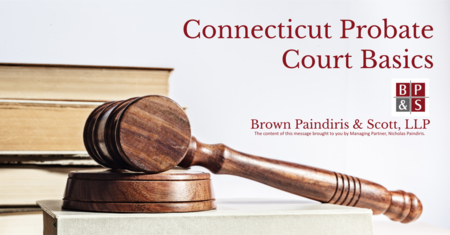A Beginner’s Guide to Probate Court
Contributed by BPS Partner Sean Peoples:
Probate courts in Connecticut handle a diverse range of legal issues in the Connecticut system of jurisprudence. Probate cases range from matters regarding the support and protection of children, seniors and individuals with mental illness and developmental impairment to name changes and restoration of firearms rights. (Visit our website to review articles relating to these issues.) However, the topic of law most commonly associated with Probate Courts is the settlement of decedents’ estates.

Probate courts deal with estates where a will has been drafted (the person dies testate), and estates where the decedent dies without a will (the person dies intestate). If a person dies without a will, an interested person, usually a surviving spouse or child, may apply to the Probate Court for the administration of the deceased person’s estate and the appointment of an administrator. (Visit our website to see a more detailed explanation.) If a person dies with a will, the original will must be filed with the appropriate probate forms and a certified copy of the death certificate in the Probate Court of the town where the decedent lived. The process is complicated, and may be overwhelming and require the help of an experienced attorney to make sure that all of the court’s rules, procedures and filing deadlines are followed correctly.
Brown, Paindiris & Scott LLP represents individuals involving all of the probate matters mentioned above. If you are in need of an experienced probate attorney, contact us.






